Syria was, literally and figuratively, a wild ride for me. I have millions of thoughts on my time there, but I’ll start with the first question everyone has: what was it like to travel to Syria?
Where to start with my time in Syria?
Riding my motorcycle down the ancient streets of Palmyra with nary a tourist in sight? Sipping cold beer with locals in a hidden courtyard café in a Damascene house? Climbing an empty Crusader castle to watch sunset over the Mediterranean?
It’s hard to choose just one moment among the millions.
But what was the price of these experiences?
In Syria, reminders loom on every corner: Roman façades pockmarked with bullet holes. Scorched hotels with no vacancies— there are no rooms left. Electrical blackouts sponsored by the US military’s ongoing insistence on “defending democracy” in Syria’s oil fields.
These days, Syria is a grand off the beaten track adventure for foreign tourists… but only because the country is grappling with war and an economic crisis.
Does that mean you should stay away? No, not necessarily. Syria is waiting for tourists to return.
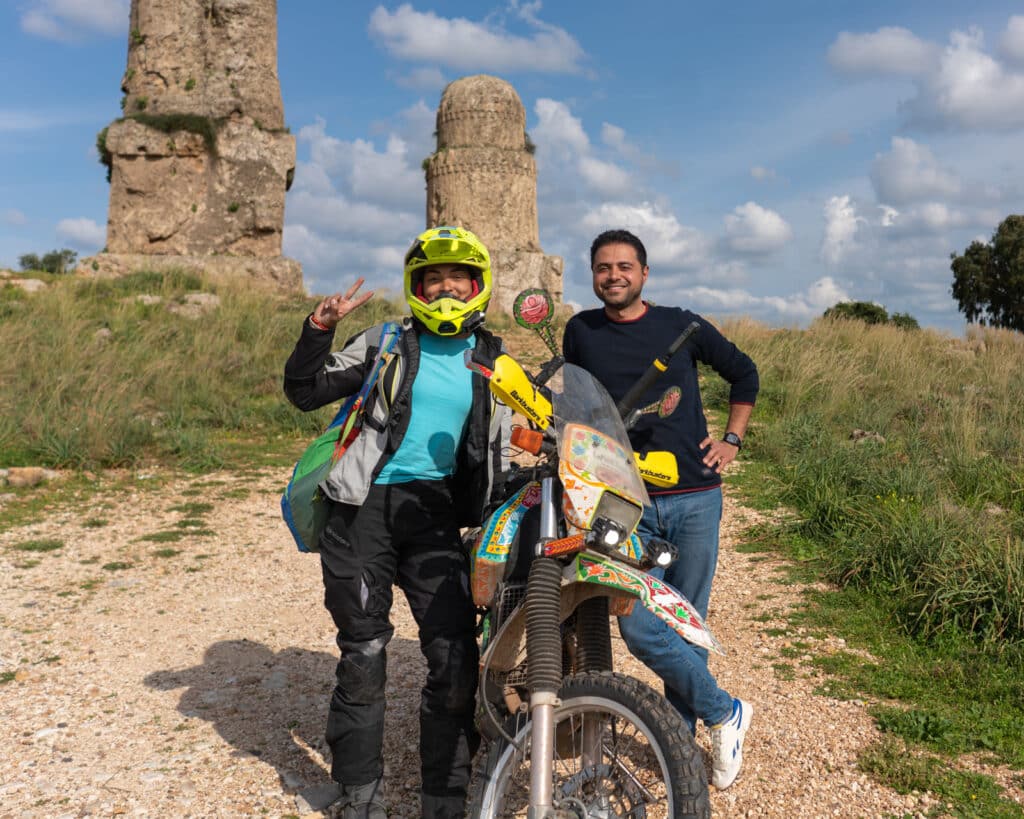
Me and my guide, Rami, cheesin’ it up in front of phallic temple ruins in the coastal town of Amrit
Wait… so can you travel to Syria?
Yes, yes you can. These days, travel to Syria is possible.
Though news headlines might make you pause, traveling to Syria isn’t as far-fetched is it may seem. The thing is, unlike other “off the beaten track” destinations I’ve visited like Afghanistan or Pakistan, Syria is relatively prepared for tourism.
What you see on the news is never the whole picture; Syria is not a shell-shocked desert wasteland, nor have earthquakes completely leveled it. Millions of tourists used to visit every year—bringing billions of dollars of revenues—before war plagued the country in 2011; Syria was not offbeat 15 years ago. The country is now a very different place, but their understanding of tourism remains. Though the possibility of further war still looms in people’s minds, Syria’s tourism industry is trying to get back on its feet.
The only requirement: foreign tourists must be accompanied by a government-approved tour guide or tour to receive a visa. This is how I ended up gallivanting across Syria by motorcycle with Syrian Guides, a young but experienced tour company based in Damascus. Rami, Mary, and Bashar are passionate about rebuilding their country, and they want people to know that yes, it is possible to visit Syria. Yes, it is safe to travel to Syria.
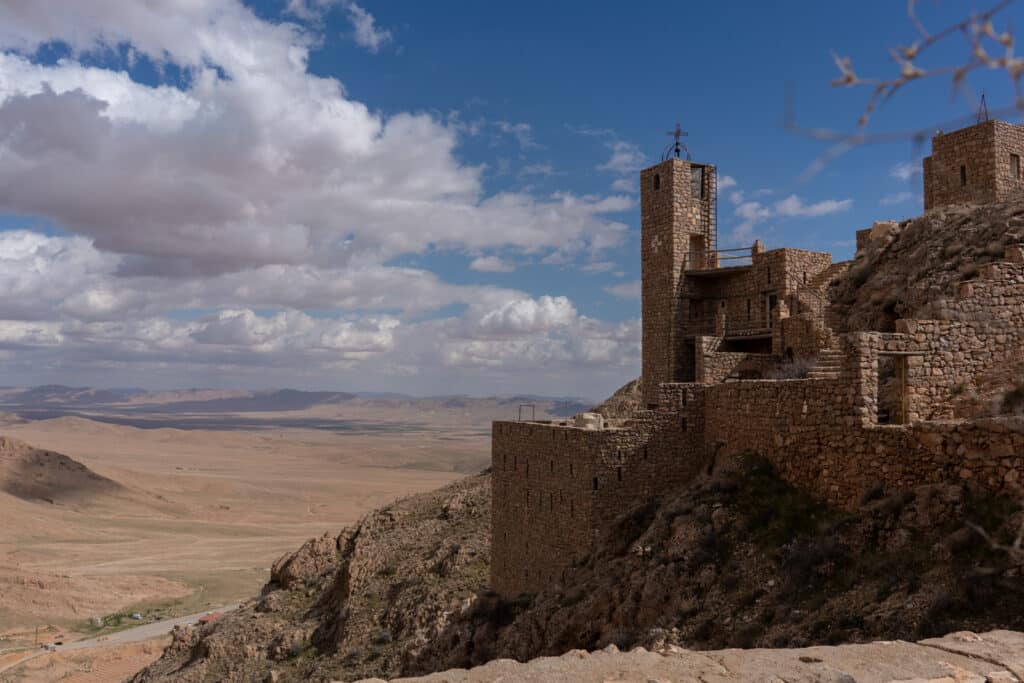
A peaceful afternoon at Mar Musa monastery
So what’s it like to travel to Syria these days?
Honestly, I wasn’t sure what to expect when traveling to Syria, aside from snippets of places I’d seen on social media. I knew war devastated much of Syria, but I also knew war is not all-encompassing. There are still millions of Syrians living in Syria; I wanted to see this life carrying on beyond the war.
(To be honest again: some purposeful ignorance on my part. I like to be surprised.)
After my time in Syria, it is no lie: Syria exceeded all my expectations.
Traditional guesthouses with gurgling fountains and courtyards shaded by lush naranj trees hid behind Damascus’ modest doors. Posh cafes filled with both covered and uncovered women smoking personal hookahs peppered city street corners. My guides and I had ancient castles and colonnades all to ourselves. I could sit and sip a glass of wine among olive groves just as readily as I could wander old city streets while listening to the call to prayer. Syria was a beautiful blend of customs, religions, and cultures; just what I’d hoped for from this country at the crossroads of history.
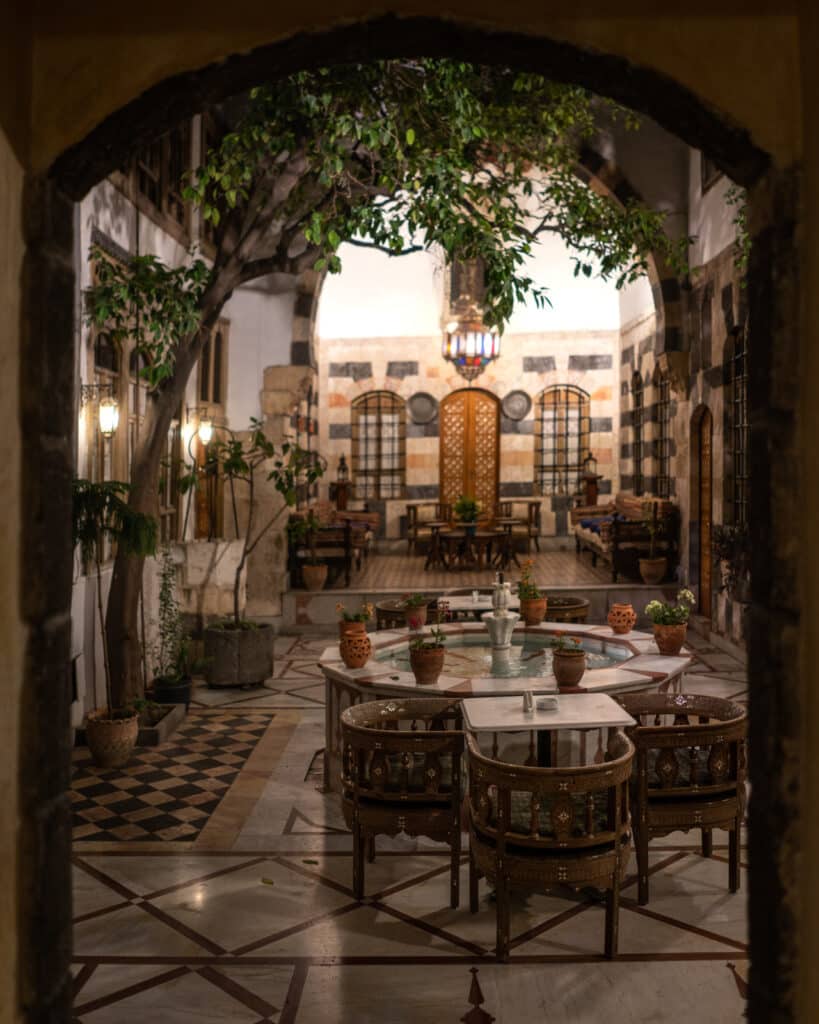
A hidden paradise behind the modest walls of Old Damascus
But Syria is also a geopolitical crossroads. Despite all my positive experiences, war was never a distant thought.
For more than a decade, Syria has been a battleground for civil war and one of the most complicated proxy wars in history. Saudi vs. Iran, the US and Russia, Kurdish rebels and Syrian regimes… Political rivalries cast a dark shadow on Syria’s resilient beauty. I watched boys herding sheep through fields of yellow wildflowers punctuated by crumbling shells of homes caught in crossfires. Cities’ shisha cafes and bars packed with patrons glittered in the night, but my rides between cities were pitch black after sunset, many villages long abandoned to violence and military occupation.
The reality is that travel to Syria is simultaneously comfortable and uncomfortable. Travelers can easily find comfortable accommodations and organized tourist infrastructure… but we must also face the uncomfortable reality that this country is still grappling with war and economic crisis.
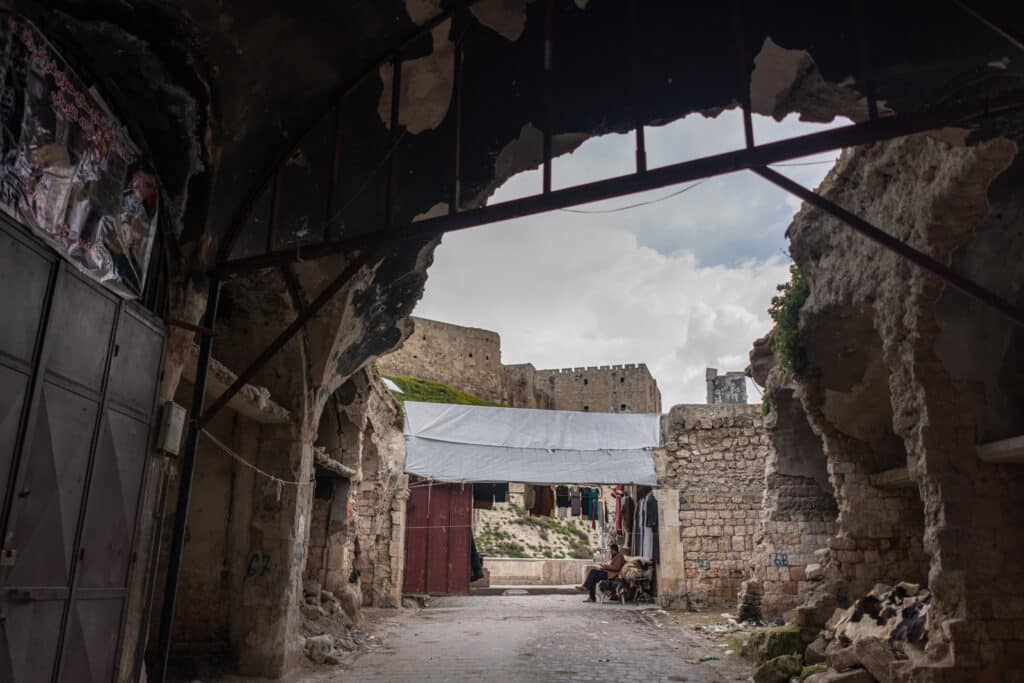
Current Syria in a nutshell: a resilient man selling his wares in the remnants of the destroyed Al-Madinah souq in Aleppo.
Is it safe to travel to Syria now?
I can imagine some of you now rolling your eyes, questioning my judgment. “Sheesh, this woman is recommending we travel to a war zone?! What is she smoking?”
I promise you—Syria is safer than many of you would expect.
I’ll go more in-depth into safety in Syria in a later post, but for starters, be aware of these two things:
- Your safety in Syria will be managed by someone who knows a lot more than you. Because you need a guide or tour to get a visa, you will—presumably—be advised by a guide who is up-to-date on the current security situation, knows where to go and where to avoid, etc. I can’t speak for all tour companies in Syria—I’m sure there are disingenuous ones—but I felt that I was in safe hands with Syrian Guides. They were very open about security threats in the past, constantly checked in to see if I had concerns, and they are very well-connected within the country should something happen.
- It’s difficult for tourists to reach dangerous places in Syria. Yes, there are still dangerous areas in Syria, but there are also military and police checkpoints all throughout the country. These officials constantly monitor who is moving in and out of their area. If an area is under threat for any reason, they’re not going to let foreign tourists enter as a safety precaution.
What about the war in Gaza?
Israel’s war in Gaza is terrible, but the vast majority of attacks are happening within Gaza, not elsewhere. There have been a handful of strikes in Syria, but they were primarily targeting places tied with Iranian military or officials, not places where casual foreign tourists are likely to be. At one point, missiles were launched at the Aleppo and Damascus airports, but those were targeting runways in an attempt to disrupt supply chains, not kill people.
It might be a scary assessment to make, but it’s important to realize that you’re statistically not very likely to be affected by any kind of attack. You’re more at risk crossing the road (or driving) during rush hour than you are to be hit by an air strike.
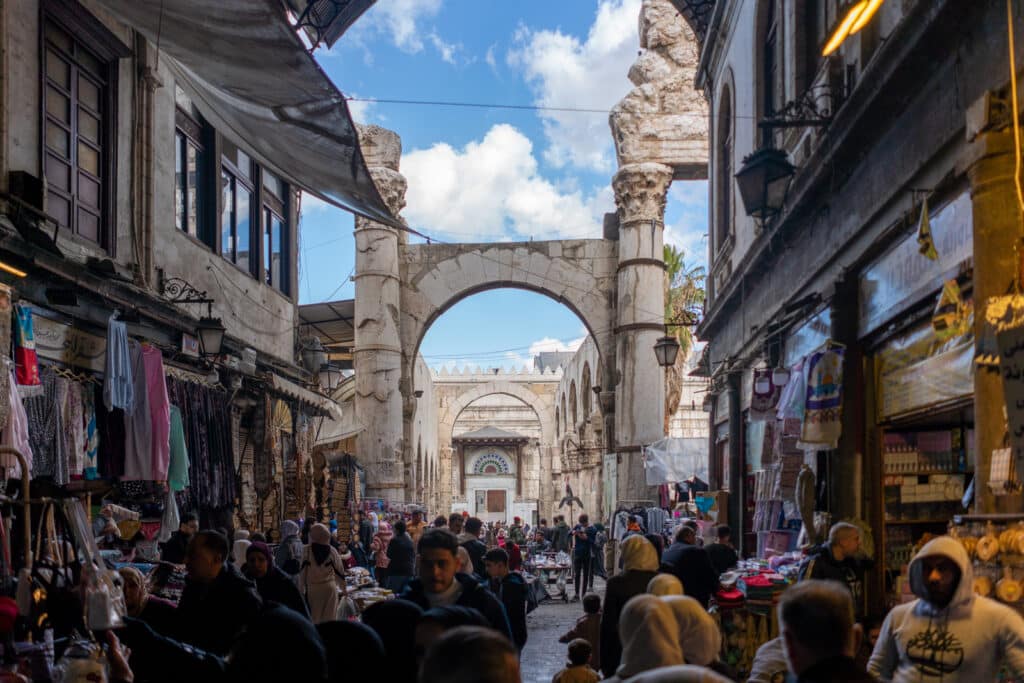
The endless buzz of Damascus’ Al-Hamidiyeh souq… with an epic backdtop just in case the souq wasn’t exciting enough.
Should I travel to Syria?
Now that you’re presumably a bit more convinced to travel to Syria, we reach the right—and final—question! Should you travel to Syria?
Syria is a complex country; culturally, politically, historically. Motivations to visit can be equally ethically complex.
There are many legitimate reasons to travel to Syria: interest in Syria’s history and cultures. Bonds with Syrian people abroad. A desire to support a struggling tourist industry. Curiosity about the reality of life in war-torn countries.
But if you’re only interested in traveling to Syria to ogle destroyed buildings, do photoshoots in the rubble, or make clickbait vlogs about “surviving” in a military state… please think twice. Syrian people are going through a long and difficult rebuilding process. The country does not need people coming to treat it as a dark tourism playground. There is a difference between acknowledging war and centering or glorifying it; how would you feel if the world identified your home only as a war zone?
If that’s not the case, however, I believe Syria will happily welcome you. Return Syrians’ inevitable kindness by being respectful, genuinely curious, and willing to listen and learn rather than letting your biases lead you. Recognize that you are privileged to be able to travel recreationally to the country when so many of its people struggle to return. The same needs hold for many countries, but I think they’re particularly important in a country as vulnerable as Syria currently is.
To all the curious travelers considering travel to Syria to learn more about its magic, its struggles, and everything in between, my recommendation is simple: do it.
Transparency: My trip to Syria was sponsored by Syrian Guides. That being said, I don’t agree to partner with any random company… nor do I say good things if they’re undeserved. Though the company itself is young, all of the staff have years of experience guiding tourists with major tour companies. They were extremely professional, organized, and accommodating. My guides, Rami and Bashar, were highlights of my trip. They were not shy about the hard discussions, always ready for a laugh and trying something new, and to say we had a grand adventure would be an understatement. Syrian Guides made everything possible—including helping me quest on motorcycle—and I can’t recommend them enough. You can get in touch with them on their website, www.syrianguides.com, or read other travelers’ (enthusiastic) reviews of them on TripAdvisor.
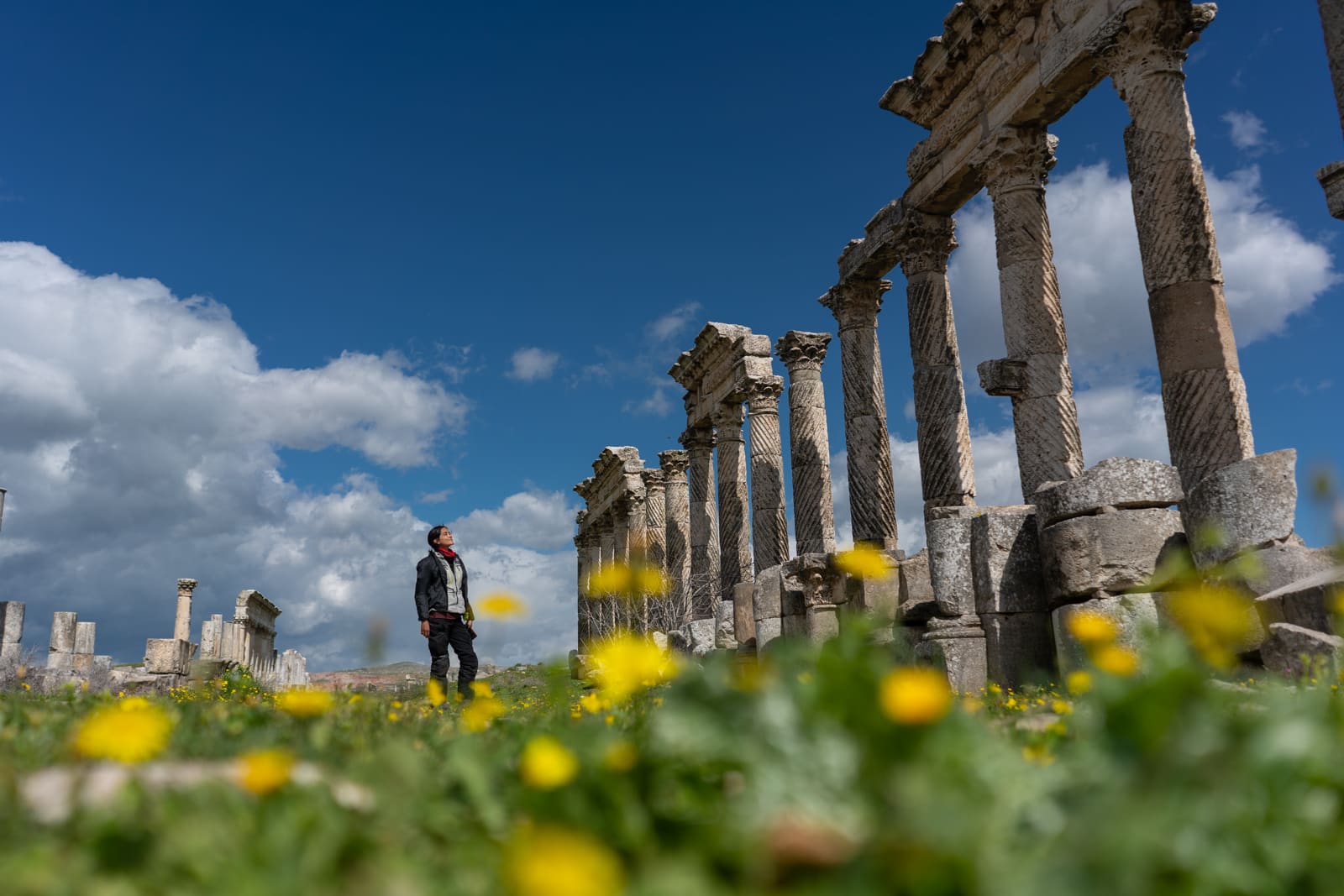


Your posts of your travels through Syria are quite beautiful and captivating. Once a skeptic, I now want to go and see the places you visited. Thank you for opening my eyes. Syria is now on my bucket list!💜
Your blog is a constant source of inspiration for me. Your passion for your subject matter is palpable, and it’s clear that you pour your heart and soul into every post. Keep up the incredible work!
I found this post to be very enlightening. Your clear and concise writing style makes it easy to understand the topic, and the practical examples you provided were particularly helpful. Thank you for taking the time to create such a comprehensive resource.
An informative and well-written piece. The principles are easily understood and applied thanks to your thorough explanations and practical examples. Thank you for taking the time to provide such detailed information. Your time and knowledge are much appreciated.
What a superb piece of writing! Both the thoroughness and lucidity of your analysis are much appreciated. Your data was both practical and pertinent. This is a post that I will return to at a later date. Your knowledge and insight are much appreciated.
ucuz sunucu barındırma
ugun fiyat vps sunucu
uygun fiyat vds sunucu
ucuz reseller hosting
ucuz reseller hosting